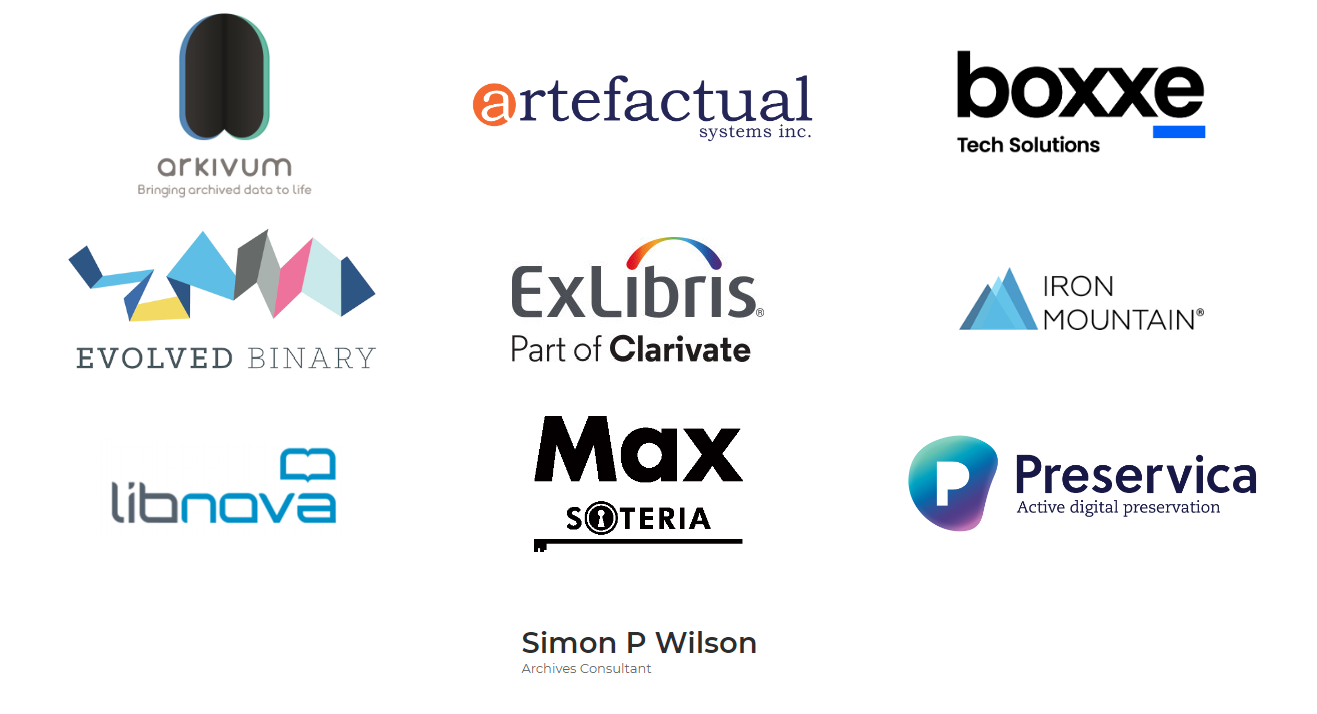DPC
Doing Digital Preservation
Adam Harwood is Research Data and Digital Preservation Technologist at the University of Sussex
For two and a half years we have been talking about doing digital preservation here in Special Collections at the University of Sussex. We've also been convincing various people that we should be doing digital preservation. We've been holding meetings, giving presentations, obtaining resources, evaluating products, reading blogs, figuring out integrations, working through possible workflows, attending conferences and workshops, collaborating with researchers and trying to figure out a forensics process. And learning - we've been doing a hell of a lot of learning. Two and a half years of being a digital preservation professional and I've not done a single bit of any actual digital preservation. Sure, I've played with a few pieces of software, calculated checksums, generated METS files and BagIt folders, but only in the name of learning.
Taking Stock after 15 years Panel at iPres 2018
Colin Armstrong is a Disc Imaging Technician at the British Library and attended iPRES 2018 with support from the DPC's Leadership Programme which is generously funded by DPC Supporters
One of the later sessions I attended at iPRES 2018 was the ‘Taking Stock after 15 years at iPres 2018’ panel session. The speakers on the Panel were Barbara Sierman (Digital Preservation Manager in the Research Department at the National Library of the Netherlands), Sheila Morrissey (Senior Researcher at Portico), and Maureen Pennock (Head of Digital Preservation at the British Library), with the general theme being what has worked and what hasn’t worked in the preservation of digital artefacts, and what to expect in the coming years.
A valediction for validation?
This blog post is an expansion and update of a reply I made to the digipres listerv in response to a query from Bernadette Houghton. It's also part of a response I began making at the Apres iPRES unconference to colleagues who were concerned I wasn't being disruptive enough at this year's iPRES (bless you all). The spirit of this blog post is for them.
This is what Bernadette asked:
"I’m currently doing some research into file format validators (e.g. http://description.fcla.edu/) and during my testing noted that anomalies are very common; at least, for those random files I’ve been checking.
In the real digital preservation world, what’s the best practice in regard to files with anomalies detected? Are the files preserved as they are, or are they resaved (either into the same or a different format) to get rid of the anomalies?
Of course, it may be that the anomalies are a result of a bug in the validator rather than the files themselves. But that isn’t always going to be apparent."
This is an issue many will be familiar with. Applying validation and attempting to make it work for us is not straightforward. In fact, it seems so far from working for us that I'd like to step back a little and consider whether validation is meeting our digital preservation needs, and if there's another direction we could take?
Learning from our past: Recent digital preservation initiatives at LAC
Faye Lemay is Digital Preservation Manager at Library and Archives Canada
This is part 2 of a 4-part series on Digital Preservation at Library and Archives Canada. Part 1 is posted here: https://www.dpconline.org/blog/building-momentum-for-change
In part 2 of this series, we describe the recent initiatives at LAC leading up to the creation of the Strategy for a Digital Preservation Program.
In the early 2010’s, the Digital Preservation business unit was a fledgling team. There were multiple internal and external pressures on LAC to beef up its digital preservation capacity, such as an accelerating volume of digital materials that needed to be preserved for the long-term. In 2014, the Auditor General of Canada had issued a report raising questions about the readiness of LAC to handle digital records as the format of choice by 2017. It stated that LAC “must articulate these plans in its vision, mission and objectives. It must put in place strategies, policies and procedures that will allow the transfer and preservation of digital information so that it is accessible to current and future generations”. The audit report highlighted “the need for an electronic archival system such as a trusted digital repository to acquire, preserve and facilitate access to the digital collection”.
Web Preservation at iPRES 2018
Colin Armstrong is a Disc Imaging Technician at the British Library and attended iPRES 2018 with support from the DPC's Leadership Programme which is generously funded by DPC Supporters
It is important to state fae the off that web preservation and internet archiving is not something I am particularly familiar with; so I was pleased to attend the morning paper presentations on web preservation and get tae grips with the terminology, learn about some practical theories in identifying and measuring web page similarity, understand how different web archive collections are created, and learn about some of the tools used to detect when collections go off-topic.
Researching malware at the British Library
I have recently travelled from Melbourne, Australia to work on a three-month research project with the Digital Preservation Team at the British Library. This project will explore the role of virus checking in long-term collection management and digital preservation.
Computer viruses are a form of malware—an umbrella term which refers to various types of ‘malicious software,’ including viruses, spyware, ransomware, worms and Trojan horses (Symantec Corporation n.d.). Viruses are programs that can be disruptive and destructive to computer environments by displaying unwanted messages, deleting files or removing the BIOS (basic input/output system) so that the computer can no longer start up.
Preserving practice research: on beyond A.B.C.
This post was a collaborative effort between members of the University of Kent Templeman Library: Helen Cooper, Elspeth Millar, Katie Edwards, Rosalyn Bass, Clair Waller and Josie Caplehorne
The University of Kent was founded in 1965 as a new kind of interdisciplinary institution, a ‘community of scholars’. It was based on a collegiate system that actively encouraged both students and staff to go beyond narrow disciplinary boundaries. There were no set departments, and students undertook a compulsory year of ‘interdisciplinary studies’ at the beginning of their undergraduate degrees. It has since taken on a more traditional structure but endeavours to remain true to these values.
The Archives and Records Management Quality Improvement Framework - not just another boring tick box exercise
The Archives and Records Management Services Quality Improvement Framework (ARMS). It’s not exactly a catchy title, is it? Quality improvement frameworks don’t usually inspire curiosity, never mind excitement. If you have come across ARMS or other QI frameworks, you might be thinking this looks like a lot of work, I already know what our strengths and weaknesses are - what are the benefits? There are quite a few:
- Raising your profile
- Supporting you in achieving the archive accreditation standard
- Implementation of the Public Records (Scotland) Act, 2011 and other legislation
- Overcoming challenges, addressing your priorities
- Working more efficiently
- Evidencing your value – to funders and a range of stakeholders
If you’re working in an archive or records management context, pushed for time and sceptical about self-evaluation and improvement frameworks, please read on. I can’t promise you’ll end up being a convert but hopefully you’ll be clearer on the benefits (and maybe even a little excited).
What ARMS is and what it isn’t…
Email is the correspondence of the future (and the present?)
Dave Heelas is the Archivist and Records Manager for Unilever Art, Archives & Records Management
The last challenge we have encountered that I am going to focus on with these short blogs is the question of email. So far not a lot of email content, either individual messages or full accounts have made it to the archive. But with those that have a few questions in how we handle this in the future have arisen.
Although we have workflows in place to preserve email and can be confident that at least in the immediate future this is protected. How to deal with the sheer quantity of it all however is another issue entirely. Current preservation of email has been done in one off ingests with individual emails being sent directly to the archivist dealing with the collection. In the future how we approach this will clearly need to change, the potential of scale for emails that won’t be relevant to our collecting policy will present quite an issue. Gone are the days of the correspondence file, now the majority of people have all their emails in their inbox and outbox and rely on prior knowledge and search tools in order to find older discussions.
Career Development Fund Guidelines
Download a PDF copy of the Career Development Fund Application Guidelines
Introduction
The DPC recognizes the very great need among our members for access to specialist training and professional development opportunities. The DPC Career Development Fund (previously known as the Leadership Programme) was created to offer an ongoing programme of grants so that our members can attend courses, events, or other training and development opportunities that will help them build digital preservation capacity at their organization. It is generously sponsored by the DPC Supporters. Over the course of its lifetime, it has provided over 200 grants for members.
DPC Members can access Career Development Fund grants in two ways:
-
Advertised Calls. The DPC publishes periodic calls for applications to attend events, courses and other development opportunities that have been selected for inclusion in the programme and approved by the Workforce Development Sub-Committee.
-
Member Self-Identified Opportunities. Members can submit an application for any development opportunity they have identified and believe will help build digital preservation capacity within their organization.
In addition, the DPC seeks to reduce the risks that training providers face when developing and providing courses and development opportunities relevant to digital preservation. The DPC invites training providers to discuss the possibility and appropriateness of offering Career Development Fund grants for such opportunities.
Career Development Fund grants are only available to DPC Members, including prospective members whose request to join is approved by the relevant grant application deadline. A full list of DPC Members is on the website at http://www.dpconline.org/members/list-of-members.
Further details about eligibility, criteria, and conditions for these two types of Career Development Fund grants are provided in the sections below. Applicants are encouraged to contact the DPC Training and Grants Manager (Amy Currie, amy.currie[at]dpconline.org) should any questions arise.
Guidelines for Advertised Calls
The DPC publishes periodic calls for applications to attend events, courses and other development opportunities that have been selected for inclusion in the programme and approved by the Workforce Development Sub-Committee. These grants for Advertised Calls are published via the DPC News page and listed on the DPC Grant Calendar page.
Funding Available
Funding levels will be stated in the published advertised call on the DPC News page. In the majority of cases, the grant will provide funding to help with expenses incurred in attending the opportunity. This may be used towards any one or all of the following expenses:
- Course fees or event registration costs [online or in-person]
- Hotel booking for multi-day courses or development opportunities [in-person, based on preferred Hotels list provided by organizers]
- Contribution towards travel expenses [in-person]
The amount of funding is at the discretion of the review panel and will be explicitly stated in the grant offer letter to successful applicants.
Eligibility
Grant applications for Advertised Calls are invited from officers, staff and affiliates of the organizations listed as members of the DPC on the Coalition’s website, and prospective members whose request to join is approved by the relevant grant application deadline.
Please note that only one application can be made per DPC Member per advertised grant opportunity. The main DPC Member contact will have final approval for who may submit an application on behalf of their organization, and applicants should take steps to ensure they are not inadvertently competing with colleagues.
Individuals associated with consortia or funded through agencies that are members of the DPC are eligible. However, they must confirm their application with the main DPC contact within the agency before applying. The DPC may pass the details of applications to the main DPC contact within these organizations as part of their assessment.
Applicants must be employed or funded by a DPC member organization/agency/consortia during the time of the grant opportunity (e.g. a fixed-term contract covering the time period in which the course or event will take place).
Honorary Personal Members of the DPC are also eligible to apply for these grants.
Allied Organizations are not eligible to apply for these grants.
Guidelines for Member Self-Identified Opportunities
The DPC has extended the Career Development Fund to allow DPC Members to apply for grants to attend training and development opportunities they have self-identified to address specific training needs.
These grants are available to DPC Members to help meet their own particular development needs. Those interested in applying for one of the grants should refer to the following guidelines for eligible courses or development opportunities:
-
Grants for the course or opportunity should not currently be offered by the Career Development Fund. Please contact the Training and Grants Manager if you are unsure.
-
Opportunities need not focus on digital preservation topics. Topics that are adjacent to digital preservation or cover the more generic skills identified in the DPC Competency Framework are acceptable. Applicants need only demonstrate how the opportunity will directly benefit their organization’s digital preservation activities.
-
Applications are particularly encouraged for grants that will enable early years’ professionals or junior members of staff to participate in development opportunities such as presenting papers or posters at a conference.
-
Grants are not available to support activities such as work shadowing or staff exchanges.
Applications are received on a rolling basis but must be received at least 10 weeks before the registration deadline of the proposed activity.
Funding Available
The amount of funding offered to successful applicants is at the discretion of the grant review panel. Please note that there is a £1500 maximum limit for funding; no member self-identified grant will exceed £1500, and the amount of funding offered will be explicitly stated in a grant offer letter to successful applicants.
Eligibility
Grant applications for Member Self-Identified Opportunities are invited from officers, staff and affiliates of the organizations listed as Full or Associate DPC Members on the Coalition’s website, and prospective members whose request to join is approved by the specified deadline for the self-identified opportunity.
The main DPC Member contact will have final approval for who may submit an application on behalf of their organization, and applicants should take steps to ensure they are not inadvertently competing with colleagues.
Individuals associated with consortia or funded through agencies that are Full or Associate members of the DPC are eligible though they must confirm their application with the main DPC contact within the agency before applying. The DPC may pass the details of applications to the main DPC contact within these organizations as part of their assessment.
Before applying, please note that:
-
Associate DPC Members can only receive one Member Self-Identified Opportunity grant per calendar year.
-
Full DPC Members can receive up to two Member Self-Identified Opportunity grants per calendar year. The two grants cannot be for the same identified opportunity or for the same applicant. In other words, each application should be for a different individual to receive a grant for a different identified development opportunity.
Applicants must be employed or funded by a DPC member organization/agency/consortia during the time of the grant opportunity (e.g. a fixed-term contract covering the time period in which the course or event will take place).
Honorary Personal Members and Allied Organizations are not eligible to apply for these grants.
Review Process and Assessment Criteria
The review process for grant applications is as follows:
-
DPC Career Development Fund review panels are typically formed of the DPC’s Training and Grants Manager, Head of Workforce Development, and at least one member of the Workforce Development Sub-Committee with no conflicts of interest in relation to the applicants. Additional members may be added to the panel if required.
-
The Training and Grants Manager collates applications and inputs basic information into a standard marksheet and circulates the applications and marksheet to the panel.
-
Reviewers fill out their section of the marksheet and return the completed marksheet to the Training and Grants Manager so that individual marks can be combined on one sheet.
-
Reviewers meet to discuss marks and select successful applicants.
-
The Training and Grants Manager notifies all applicants of the result of their application.
The review process, on average, usually takes around two weeks to complete.
Applicants are expected to complete all sections of the form by the stated deadline and are encouraged to contact the Training and Grants Manager should any questions arise while completing the sections of the form.
Review and assessment of the applications considers how the development opportunity will further the applicant’s professional development as well as digital preservation work at their organization through the short answer sections of the application. Consideration is also given to other information such as previous grants received from the DPC and the applicant’s length of contract. Grants for those who would otherwise be unable to attend due to limited funding opportunities offered by their employers are prioritized. Preference will also be given to early years professionals (i.e., those who have been in a digital preservation role for less than 5 years) but applications are also welcomed from those further on in their career or those currently researching or studying digital preservation who have been approved by their DPC member institution (e.g., post-graduate students).
An overview of the review process and assessment criteria is available here.
Conditions of Grants
It is our aim that the grants will primarily deliver benefits to an identifiable DPC member organization, but that there should also be a benefit to the broader DPC community. Therefore, recipients will be asked to produce outputs that will help disseminate the information or skills they have learned for the wider benefit of the DPC Membership. This may include, but is not limited to, a blog post on the DPC website and/or Twitter coverage of an event, or a webinar. Outputs for individual recipients will be discussed with the Training and Grants Manager subsequent to the award and will be proportionate to the size of the grant awarded.
We recommend that any member organization which supports an application discusses appropriate outcomes and benefits for the institution prior to submission.
A list of blog posts and outputs from previous grant recipients is available here.
How to Apply
Applicants should complete and return the relevant application form (list provided below) to the Training and Grants Manager (Amy Currie, amy.currie[at]dpconline.org) before the specified deadline. Applications must also be accompanied by an email or letter containing explicit approval from your line manager, supervisor, or other senior executive to undertake the opportunity as well as a commitment from the organization to meet any additional costs incurred.
Application forms for Advertised Calls
Application forms for Member Self-Identified Opportunities
-
Application form for member self-identified training/development opportunities (due ~10 weeks before registration deadline)
The application form will be used by the review panel to assess eligibility against the criteria listed above and the impact attendance will have on the applicant’s professional development and the digital preservation work of their organization. The panel’s decision is final. Successful applicants will normally be notified within two weeks of the application deadline.
Please note that applicants must be employed or funded by a DPC member organization/agency/consortia during the time of the grant opportunity (e.g. a fixed-term contract covering the time period in which the course or event will take place).
Deadlines for advertised grants will be included with the relevant call for applications. Applications for self-identified courses or development opportunities are received on a rolling basis but must be received at least 10 weeks before the registration deadline of the proposed activity.
Short notice applications will be considered depending on DPC staff capacity, and only if they are received 4 or more weeks before the registration deadline and the applicant can demonstrate that the lateness is for reasons out of their control.
All sections of the application form should be completed before submission, and applicants are encouraged to contact the Training and Grants Manager during the application process should any questions arise.
Further Information
-
For more information about the Career Development Fund, see: https://www.dpconline.org/digipres/train-your-staff/cdfund
-
For questions relating to this grant programme, email the DPC Training and Grants Manager (Amy Currie, amy.currie[at]dpconline.org)
-
For information about joining the Digital Preservation Coalition, see: https://www.dpconline.org/about/join-us
Acknowledgements
The Career Development Fund is sponsored by the DPC’s Supporters, who recognize the benefit and seek to support a connected and trained digital preservation workforce. We gratefully acknowledge their financial support of this programme and ask applicants to acknowledge that support in any communications that result. At the time of writing, the Career Development Fund is supported by Arkivum, Artefactual Systems Inc., boxxe, Evolved Binary, Ex Libris, Iron Mountain, Libnova, Max Communications, Preservica, and Simon P Wilson. A full list of supporters is online here.





































































































































